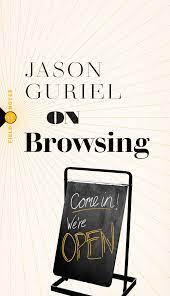
I’m a worrier. I worry when I see someone holding a smart-phone up to a baby rather than endure a little fussing, and I worry when another Dad says he puts his kids to bed telling them to amuse themselves with the iPad until they’re tired. Algorithms appear to be designed to give people more of the same, so that we become more entrenched, both in terms of the arts and our political views, even aside from the way scrolling wrecks our ability to concentrate and, you know, read a book.
The value of boredom and browsing stores get an articulate and concise summary in On Browsing by Jason Guriel: “A mind whose baseline is boredom is well primed to feel, with acute sensitivity, the slightest stimuli. A mind that’s buffeted by novelty, on the other hand, is the fender of a beater: it absorbs a lot of undifferentiated dings.” The clerks at Sam the Record Man may have occasionally been a little pompous, but they “didn’t necessarily care about your preferences, because they knew what was good for you. Even the shelves you had to pass to get to the cash – where, in most stores, the impulse buys lie in wait – were carefully curated.” Guriel remembers browsing “before smart-phones, when killing time took creativity,” and laments these days we’ve “given up the journey for the destination.”
As someone who also remembers hanging out at the mall with a few hours to spend, the book feels like an articulate epitaph for my youth and a particular era. As much as hanging out in malls, I remember hauling myself downtown to explore a few specific used bookstores at random times, hoping for magazines or books connected to my favourite shows. As Guriel notes, “You weren’t always lucky, of course, but disappointment often led to discovery.” Discoveries were given added meaning and excitement by the delay between desire and gratification. As a fan of science fiction, I still remember finding a bin of Doctor Who magazines, like a small flock of rare birds that crossed the ocean. Now, I look up various cultural items on sites like Amazon and eBay, put things on a handy online list and order when I feel like I want it and the price is decent.
Guriel quotes Saul Austerlitz in a New York Times article from 2014: “Click culture creates a closed system in which popular acts get more coverage, thus becoming more popular, thus getting more coverage.” Hollywood has banked on sequels as a pre-sold product for quite some time, but I can only imagine click culture – aside from giving us more articles about Trump – has helped encourage them in this direction. Even in the literary world, it could be argued variety is suffering. In 2022, Canada Reads was a discussion of five bestselling novels, including two Giller Prize winners. All worthy books, but with many titles going without any real media oxygen – particularly those connected to small and medium-sized presses – the CBC might ask jury members to dig a little deeper than a Giller Prize winner when selecting a book. And if any of those jury members should need a recommendation or two they need only turn to our quietly valuable independent bookstores.
Unlike a clerk, an algorithm “doesn’t operate from a place of affection,” Guriel notes. And while there’s obviously the occasional indifferent clerk, there’s never a loving algorithm. Lack of choice leaves you paying more attention to what’s sitting right there before you and possibly willing to reconsider something you dismissed, or to put it as succinctly as Guriel does in the book, “nothing grows on a scrolling mind.”
Alex Boyd helped establish Best Canadian Essays, co-editing the first two collections. His books of poems are Making Bones Walk (2007) and The Least Important Man (2012). In 2018 his first novel was published: Army of the Brave and Accidental, described by Canadian Notes & Queries as “timely, original and profound.”
Read Alex Boyd's poem"I Dreamed of My Father’s House Made Peculiar" in Issue 295 (Spring 2023)









